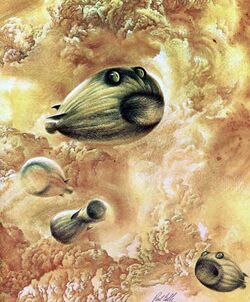
Jovian creatures, by Paul Calle
Jovians are extraterrestrial beings native to the gas giant Jupiter, the fifth planet of the Sol System. Although not as popular as Martians or Venusians, Jovians are still a fairly common theme in science fiction and astrobiology.
Because the planet is a gas giant, native inhabitants of Jupiter are usually depicted as large floating organisms, similar to jellyfish or living balloons. Astronomer Carl Sagan once proposed that creatures similar to the Atmospheric Beasts could inhabit the atmosphere of Jupiter or similar planets.
Types[]
- Edgar Rice Burrough's story Skeleton Men of Jupiter portraits the planet as a terrestrial world inhabitable for mankind and whose extreme rotation speed counteracts the high mass, rendering it with an even lower gravitational pull than Mars. Known by Martians as Sasoom and by its native inhabitants as Eurobus, the world is illuminated by volcanoes and inhabited by two humanoid races: the blue-skinned Savators and their horrendous skeletal masters the Morgors.
- Jovians serve as the primary invasion force in the 1953 novel The Kraken Wakes and its radio and game adaptations, where they colonized Earth's oceans and sought to eliminate Earthlings in a war of survival. The human scientist Alastair Bocker was the first to figure out the invaders were from Jupiter due to the invaders' strange spacecraft and their preference for heavy pressure environments matching those of Jupiter and being far too technologically advanced to have been native to Earth's oceans. The Jovian invasion force is highly advanced and easily adapted to aquatic life, even creating organic "Sea Tanks" which functioned as a fusion of various forms of sea-life which proved to be a deadly force both on land and sea. Despite their prominence in the story, it is unknown if they resemble any other notable descriptions of Jovians as their true appearance is never seen, only ever acting through their vehicles and weapons.
- Jovians are especially well represented in the works of Arthur C. Clarke, such as his short story "A Meeting with Medusa", which describes creatures native to the Jovian atmosphere. In his Space Odyssey series, a Jovian biosphere flourished on the planet, but after extensive debate the Firstborns decided to sacrifice it by turning the planet into a star to allow the development of the Europan biosphere, which showed more potential for sapience.
- Jovians were featured in the Brazilian magazine Superinteressante in June, 1999.
- Jovians have also been mentioned in the TV series ALF, although they are referred to as "Jupertonians". ALF elaborates that the real primary element of Jupiter is not hydrogen, but buttermilk, and that the natives are so proud of their buttermilk industries they refer to Jupiter as the Dairy Planet, even advertizing on their license plates.
- The Jellyblimps from Picture Atlas of Our Universe.
- The Gasbags are another example, from Dugald Steer's Alienology: The Complete Guide to Extraterrestrials.
- An arrogant and xenophobic Jovian species inhabits the planet in Isaac Asimov's humorous short story Not Final! and its sequel, Victory Unintentional.
- The Doctor Who audio story The Jupiter Conjunction, featuring the Fifth Doctor, features a race of intelligent Jovians which evolved before the rise of men on Earth, and were believed to be long extinct until some were rediscovered in the 24th century.
- In Toho's 1970 film Space Amoeba, a.k.a. Yog: Monster from Space, the eponymous entity is native to Jupiter and is able to infect Earth's sea creatures, mutating them into giant (although far from regular daikaiju size) monstrosities.
- Intelligent Jovians are featured in the series Space Patrol, along with some native fauna such as the Jovian Snake and the Loomis.
- A Looney Tunes cartoon features an Instant Martian which, unlike the others of his kind, is not seem following Martian orders and it's hinted that the being is actually from Jupiter.